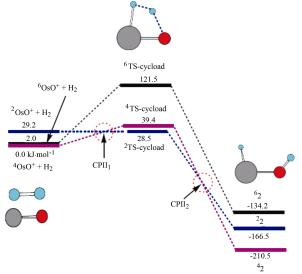| 1 (a) Nishimura, S. Handbook of Heterogeneous Catalytic Hydrogenation for Organic Synthesis, Wiley, Chichester, UK, 2001. (b) de Vries, J. G.; Elsevier, C. J. The Handbook of Homogeneous Hydrogenation, Wiley-VCH, Weinheim, 2007.2 Zhao, J.-Q. Homogeneous Complex Catalysis—Activation of Small Molecules, Chemical Industrial Press, Beijing, 2011 (in Chinese). (赵继全, 均相络合催化: 小分子的活化, 化学工业出版社, 北京, 2011.)3 Kubas, G. J. Chem. Rev. 2007, 107, 4152.4 Roithová, J.; Schröder, D. Chem. Rev. 2010, 110, 1170.5 Schröder, D.; Schwarz, H. Angew Chem. Int. Ed. Engl. 1995, 34, 1973.6 Bohme, D. K.; Schwarz, H. Angew. Chem. Int. Ed. 2005, 44, 2336.7 Schröder, D.; Schwarz, H. PNAS 2008, 105, 18114.8 Kappes, M. M.; Staley, R. H. J. Phys. Chem. 1981, 85, 942.9 Schröder, D.; Fiedler, A.; Ryan, M. F.; Schwarz, H. J. Phys. Chem.1994, 98, 68.10 Clemmer, D. E.; Chen, Y. M.; Khan, F. A.; Armentrout, P. B. J. Phys. Chem. 1994, 98, 6522.11 Baranov, V. I.; Javahery, G.; Hopkinson, A. C.; Bohme, D. K. J. Am. Chem. Soc. 1995, 117, 12801.12 Schröder, D.; Schwarz, H.; Clemmer, D. E.; Chen, Y. M.; Armentrout, P. B.; Baranov, V. I.; Böhme, D. K. Int. J. Mass Spectrom. and Ion Processes 1997, 161, 175.13 Ryan, M. F.; Fiedler, A.; Schröder, D.; Schwarz, H. J. Am. Chem. Soc. 1995, 117, 2033.14 Ryan, M. F.; Fiedler, A.; Schröder, D.; Schwarz, H. Organometallics 1994, 13, 4072.15 Kang, H.; Beauchamp, J. L. J. Am. Chem. Soc. 1986, 108, 5663.16 Fiedler, A.; Kretzschmar, H.; Schroder, D.; Schwarz, H. J. Am. Chem. Soc. 1996, 118, 9941.17 Chen, X.-X.; Wang, Y.-C.; Geng, Z.-Y.; Gao, L.-G.; Fang, R.; Zhang, X.-H. Acta Phys.-Chim. Sin. 2006, 22, 59 (in Chinese). (陈晓霞, 王永成, 耿志远, 高立国, 方冉, 张兴辉, 物理化学学报, 2006, 22, 59.)18 Fiedler, A.; Schröder, D.; Shaik, S.; Schwarz, H. J. Am. Chem. Soc. 1994, 116, 10734.19 Danovich, D.; Shaik, S. J. Am. Chem. Soc. 1997, 119, 1773.20 Filatov, M.; Shaik, S. J. Phys. Chem. A 1998, 102, 3835.21 Irikura, K. K.; Beauchamp, J. L. J. Am. Chem. Soc. 1989, 111, 75.22 Blagojevic, V.; Bozovic, A.; Orlova, G.; Bohme, D. K. J. Phys. Chem. A 2008, 112, 10141.23 Dai, G.-L.; Gao, L.-G.; Wang, Y.-C.; Fan, K.-N. Acta Chim. Sinica 2007, 65, 509 (in Chinese). (戴国梁, 高立国, 王永成, 范康年, 化学学报, 2007, 65, 509.)24 (a) Stephens, P. J.; Devlin, F. J.; Chabalowski, C. F.; Frisch, M. J. J. Phys. Chem. 1994, 98,11623. (b) Becke, A. D. J. Chem. Phys. 1993, 98, 5648. (c) Lee, C.; Yang, W.; Parr, R. G. Phys. Rev. B 1988, 37, 785.25 (a) Hay, P. J.; Wadt, W. R. J. Chem. Phys. 1985, 82, 270. (b) Wadt, W. R.; Hay, P. J. J. Chem. Phys. 1985, 82, 284. (c) Hay, P. J.; Wadt, W. R. J. Chem. Phys. 1985, 82, 299.26 Couty, M.; Hall, M. B. J. Comput. Chem. 1996, 17, 1359.27 Ehlers, A. W.; Böhme, M.; Dapprich, S.; Gobbi, A.; Höllwarth, A.; Jonas, V.; Köhler, K. F.; Stegmann, R.; Veldkamp, A.; Frenking, G. Chem. Phys. Lett. 1993, 208, 111.28 Zhang, G.-B.; Li, S.-H.; Jiang, Y.-S. Organometallics 2003, 22(19), 3820.29 Zhang, G.-B.; Li, S.-H.; Jiang, Y.-S. Organometallics 2004, 23(15), 3656.30 Berkowitz, J.; Ellison, G. B.; Gutman, D. J. Phys. Chem. 1994, 98, 2744.31 Dillard, J. G.; Kiser, R. W. J. Phys. Chem. 1965, 69, 3893. |
